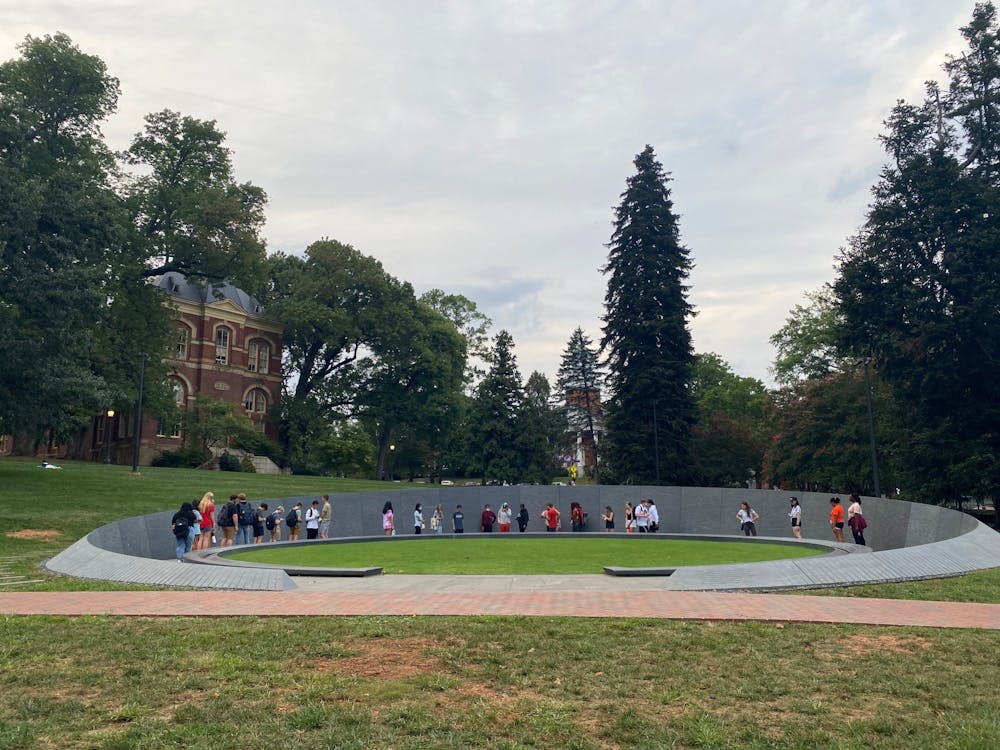This fall semester, University students across a variety of organizations — largely the History of Enslaved African American Laborers and the University Guide Service — organized historical tours and info-sessions about the University’s history of enslaved labor for the Class of 2025 and onward. This is an admirable display of students self-governing by encouraging first years to understand and contextualize the University’s history of white supremacy and its enslavement of African Americans. Tours are administered by members of the University Guide Service, who lead groups of 30 people every day of the week. The student organized tours are mapped by the History of Enslaved African American Laborers, a group of seven BIPOC third-year women inspired to increase awareness of the University's racist history. Following the historical tours, students can engage with Bringing Race Into Dialogue with Group Engagement, an organization trained in having conversations regarding race.
All this being said, Housing and Residence Life does not mandate the tours nor the processes that follow for the Class of 2025. Due to inaction from the University to implement this kind of educational resource, the onus falls on unpaid students. Senior resident and resident advisor representatives take on the responsibility of holding their residents accountable to attend one tour between Sept. 11 and Oct. 17. If first-year students do not attend the tour, SRs and RAs alike are encouraged by student organizers to schedule one-on-one meetings with those absent from the tour. The University must actively commit to educating its students and the public on its past — by no means should it place the burden of enforcement on the shoulders of students. Already, these tours are primarily student-organized, student-led and student-enforced — roles that should be filled by the University. The sole consequence for a first year not attending a tour is a one-on-one meeting with their RA. By refusing to encourage or institute repercussions for those individuals who abstain from participating in the tours, the University is neglecting to engage students critically with their historic landscape.
Moreover, let's go above and beyond the tour — we can and must do better. Third-year College student and HEAAL member Abena Appiah-Ofori said “[students] need to do what they can to support the Black community on Grounds and in the broader Charlottesville community. In the end, we want [the tour] to be a call to action.” This is absolutely correct. We need action. The University ought to require a service of physically giving back. We must have a greater sense of unity spurred by engagement between students and our local community.
Thus far, the University has failed to educate its students on its history of white supremacy and abuse of Black enslaved laborers. Opportunities for learning — such as elective courses and online resources — are available but must be sought out. To remedy this inadequacy, the University must foremost take action to educate and inform. This is not a new demand — many students, including opinion contributors Aliyah White, Grace Duregger, Yssis Cano-Santiago and Zoe Edgecomb have already called out the University for failing to recognize its past and called on the institution to implement ubiquitous education for students and the public on this history. Along with these calls to action, the University must also encourage community-oriented student involvement. Academic observation of discrimination is insufficient — learning about a history of Black exploitation without taking active measures to remedy and support affected communities is a waste of resources. The University should engage itself and its students in the contemporary Black community in Charlottesville.
In an age of simply checking the boxes, enough is enough. This effort of connection focuses on creating community and relationships among students, the local community and their shared history. This actionable process would be in contrast to prior performative acts undertaken by the University. Through actively taking part in authentic relationship building in our community, we can demonstrate the University is not exclusively paying lip service. Rather, the University must attempt a sincere effort and investment to fortify our connections between student and community.
The Cavalier Daily Editorial Board is composed of the Executive Editor, the Editor-in-Chief, the two Opinion Editors, their Senior Associate and an Opinion Columnist. The board can be reached at eb@cavalierdaily.com.







